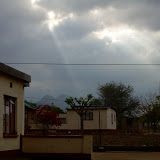My Aspiration Satatement
When I was invited to join Peace Corps South Africa, I was asked to write an aspiration statement that answers five simple questions and (ideally) helps to place volunteers appropriately within the country. During an intensive room cleaning yesterday, I uncovered a copy of my answers and read over it again. It struck me that my expectations and attitude when entering Peace Corps were realistic and pretty accurate to many of the experiences I had. Even my answer to the last question about what is to come after Peace Corps has not changed significantly. So I decided to share my original aspiration statement:
The professional attributes that I plan to use, and what aspirations I hope to fulfill, during my Peace Corps service.
Having worked at a non-profit and having run my own business for several years, I bring knowledge of business strategies and tools, which may apply to the NGO (Non-Governmental Organization) that I am working with. But more importantly, I think that I will simply contribute a fresh perspective. So easily, such organizations can get bogged down in certain details or overextended by too many different programs. In addition, local business strategies may prove ineffective or insufficient for the organization’s goals. In all these situations, simply having a different perspective to draw attention to certain assumptions or overlooked choices can prove immensely helpful. On top of this, I feel that my time will be most beneficially spent by helping fill the needs of the organization. As much as I may see different ways of doing things, it will be important for me to help the organization achieve and carry out its existing obligations and programs. This will both help the organization itself, and will also help foster a mutual trust and understanding. Overall, I have tried to keep my aspirations realistic in terms of understanding that change may be slow or difficult to achieve. In this sense, I understand that my contributions to the organization may be slow to come to fruition. For this reason, I am eager to try to contribute in other ways, through secondary projects within my community, such as tutoring or IT work. (Of course these secondary projects may be no easier to implement, but I hope to try to contribute in multiple ways.)
My strategies for working effectively with host country partners to meet expressed needs.
After reading the assignment description and talking with other RPCV (Returned Peace Corps Volunteers), I think the most important strategy will simply be patience. In order to instigate any change, it is fundamentally important to build trust and connections with coworkers in the NGO. Trying to instantly achieve change will be futile and insulting to people who have been working in these organizations for years. As a foreigner from an affluent country, I will be faced with the challenges of breaking down stereotypes and forming open and honest connections with others in the community. Without this, any changes I suggest will most likely end up ignored or will last only until my departure. In addition, even with the trust of coworkers within the organizations, it is important to seek change by providing guidance and making suggestions (i.e., let those closest to the organization instigate change, while I only try to help guide and shape the changes). This helps to empower people and will lead to longer lasting changes.
My strategies for adapting to a new culture with respect to my own cultural background.
My strongest asset in adapting to a new culture is a skill I learned back during high school. Going to a rather small, new school (only 37 in my graduating class), one is forced to be friends with all fellow students. With such a small student body, students do not form smaller groups as would happen at a large school, but rather learn to befriend everyone. This generally involves being unassuming, welcoming differences (rather then looking for similarities) and exhibiting a patience and genuine interest in learning about others’ ideas and views. Although the cultural diversity in my high school is low in comparison to what I will find in South Africa, I feel that my experience has enabled me to connect more easily with different cultures, beliefs or worldviews, and this skill will be invaluable when I am immersed in such a different culture.
The skills and knowledge I hope to gain during pre-service training to best serve my future community and project.
During the pre-service training, my primary hope is to learn about the culture and customs of people living in South Africa. Undoubtedly, much of this will be learned from actually living in the community and working within an organization, but I imagine that having a 'heads up' to the different customs will help me to better respond and better adapt. For example, after reading about the central role of religion within the culture, I would appreciate learning a respectful and quiet way of avoiding the topic of my religious beliefs. Although I am interested in taking part in religious events, I would feel uncomfortable professing false beliefs. Learning to negotiate such situations in advance will be beneficial and will help ease the cultural transition, minimizing offense and missteps.
How I think Peace Corps service will influence my personal and professional aspirations after my service ends.
In terms of personal and professional aspirations following the Peace Corps, I am very open. Primarily, I am confident that my experience will serve as a 'consciousness raiser' (the term is borrowed from Richard Dawkins), in terms of helping broaden my perspective and understanding of the current human condition. In this way, I hope that I will achieve some level of personal growth throughout my experience. As for professional aspirations, following the Peace Corps, I hope to attend graduate school and pursue a Ph.D.


